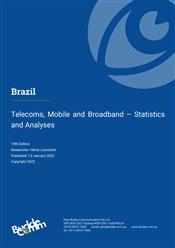Brazil Telecoms Market Report
Telecoms, Mobile and Broadband - Statistics and Analyses

Brazil’s regulator concludes 5G spectrum auction
Brazil has one of the largest mobile markets in Latin America due to the sheer size of its population. Healthy competition in the mobile market has helped reduce the price of mobile services in Brazil in recent years and mobile service providers have had much success in converting their customers from prepaid to contract plans. Mobile broadband take-up has been rapid, with around 250 million subscriptions as of October arch 2021, bringing the penetration rate to 117%.
The principal telcos include Telefónica Brasil, operating fixed-line and mobile services under the Vivo brand, as well as América Móvil operating services under the Claro brand. Oi also offers a range of services though the company’s financial difficulties recently forced the company to sell its mobile, tower and data centre units in a bid to reduce debt.
The multi-spectrum auction, intended to push the development of 5G, was scheduled for March 2020 but was delayed due to interference issues with satellite TV broadcasts and the pandemic. The auction was completed in November 2021, and spectrum was assigned in the following month. The licensees are obliged to provide 5G services to all capital cities by July 2022, as well as about 35,500km of the national highway network.
The country also has one of the largest fixed line broadband markets in Latin America, though broadband penetration is only slightly above the regional average, trailing behind Chile, Argentina, and Uruguay. Amendments to the licensing regime adopted in October 2019 also require that ISPs which have switched to authorisations invest money saved from lighter regulations in the expansion of broadband services.
The fixed line broadband market has seen rapid growth for a number of years, with a growing focus on fibre broadband. In 2019 the number of fibre accesses overtook DSL connections. Vivo has the largest share of the fibre market, followed by Oi and Claro.
The country is a key landing point for a number of important submarine cables connecting to the US, Central and South America, the Caribbean, Europe, and Africa. Several new cable systems are due to come into service through to 2022, which will increase bandwidth and push down broadband prices for end-users. Investments have also been made into terrestrial fibre cables between Brazil, Argentina, and Chile.
The traditional fixed-line market continues to suffer from consumers substituting services for mobile and fixed broadband solutions.
This report provides a review of Brazil’s telecom market, including infrastructure and the regulatory environment. It profiles the main fixed-line operators and provides relevant statistics and analyses. The report also covers the mobile voice and data segments, providing a range of statistics and analyses, as also subscriber forecasts. In addition, the report reviews the fixed and fixed-wireless broadband sectors, including an assessment of technologies and regulatory influences.
Key developments:
- Regulator concludes multi-spectrum 5G auction;
- IHS completes its acquisition of a 51% stake in FiberCo;
- BTG Pactual buys 58% of Oi’s fibre business Infraco for $2.3 billion;
- Regulator allows accredited MVNOs to sign access agreements with more than one MNO;
- Algar Telecom acquires Vogel Telecom, adds 3,400 corporate clients;
- Regulator allows operators with spectrum in the 850MHz band to extend their concessions until the end of November 2028;
- Tannat submarine cable connecting Brazil and Argentina ready for service;
- Telefónica Brasil and CDPQ create wholesale fibre broadband business, dubbed FiBrasil;
- América Móvil spins off towers and other related passive infrastructure in its Latin American markets;
- Operators launch 5G services on a limited basis;
- Report update includes the regulator's market data updates to June 2021 and operator data to Q3 2021, updated Telecom Maturity Index charts and analyses, assessment of the pandemic on the telecom sector, recent market developments.
Companies mentioned in this report:
Telefónica Brasil (Vivo), Brisanet, BTG Pactual, TIM Brasil, Claro, Huawei, Oi, Nextel Brasil, CTBC/Algar Telecom, Sercomtel Celular, Vodafone Brazil/ARQIA, Embratel, Ericsson, Google, GVT, Universo Online (UOL), Net Serviços de Comunicação, Intelig, Neovia, Eletropaulo Telecom, Copel, BuscaPé, Global Crossing, Star One, TelesatBrasil, Hispamar, Telebrás, Intelig.
Related Reports
- Latin America - Mobile Network Operators and MVNOs
- Caribbean - Telecoms, Mobile and Broadband - Statistics and Analyses
- Dominican Republic - Telecoms, Mobile and Broadband - Statistics and Analyses
- Haiti - Telecoms, Mobile and Broadband - Statistics and Analyses
- Puerto Rico - Telecoms, Mobile and Broadband - Statistics and Analyses
- Panama - Telecoms, Mobile and Broadband - Statistics and Analyses
- Paraguay - Telecoms, Mobile and Broadband - Statistics and Analyses
- El Salvador - Telecoms, Mobile and Broadband - Statistics and Analyses
- Chile - Telecoms, Mobile and Broadband - Statistics and Analyses
Share this Report
TMT Intelligence
A platform to scale your intelligence tasks
Monitor critical insights with our AI-powered Market Intelligence Platform gathering and analyzing intelligence in real time. With AI trained to spot emerging trends and detect new strategic opportunities, our clients use TMT Intelligence to accelerate their growth.
If you want to know more about it, please see:
Research Methodology
BuddeComm's strategic business reports contain a combination of both primary and secondary research statistics, analyses written by our senior analysts supported by a network of experts, industry contacts and researchers from around the world as well as our own scenario forecasts.
For more details, please see:
More than 4,000 customers from 140 countries utilise BuddeComm Research
Are you interested in BuddeComm's Custom Research Service?
Hot Topics
News & Views
Have the latest telecommunications industry news delivered to your inbox by subscribing to BuddeComm's weekly newsletter.